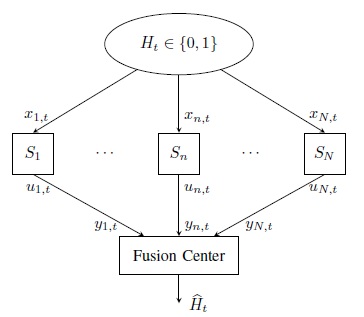- ALL COMPUTER, ELECTRONICS AND MECHANICAL COURSES AVAILABLE…. PROJECT GUIDANCE SINCE 2004. FOR FURTHER DETAILS CALL 9443117328


Projects > ELECTRONICS > 2017 > IEEE > DIGITAL SIGNAL PROCESSING
We consider the problem of decentralized hypothesis testing in a network of energy harvesting sensors, where sensors make noisy observations of a phenomenon and send quantized information about the phenomenon towards a fusion center. The fusion center makes a decision about the present hypothesis using the aggregate received data during a time interval. We explicitly consider a scenario under which the messages are sent through parallel access channels towards the fusion center. To avoid limited lifetime issues, we assume each sensor is capable of harvesting all the energy it needs for the communication from the environment. Each sensor has an energy buffer (battery) to save its harvested energy for use in other time intervals. Our key contribution is to formulate the problem of decentralized detection in a sensor network with energy harvesting devices. Our analysis is based on a queuing-theoretic model for the battery and we propose a sensor decision design method by considering long term energy management at the sensors. We show how the performance of the system changes for different battery capacities. We then numerically show how our findings can be used in the design of sensor networks with energy harvesting sensors.
Non-coherent Modulation.
In this paper we studied the problem of decentralized hypothesis testing in a network of energy harvesting sensors. The sensors in the network make observations of a phenomenon and harvest all the energy they need from the environment. We consider the case where the sensors have different battery capacities to save the harvested energy. The novelty of our work is in the formulation of a decentralized detection problem with system costs coupled to the random behavior of the energy available at the sensors. Concretely, we will find the depletion probability at the sensor batteries, and evaluate the performance of the network for different battery capacities (buffer sizes). We will show how the problem formulation changes (compared to the unconstrained case) when we consider the energy features in the problem of designing the sensors in the network.
SYSTEM MODEL
